Lecithin is a molecular compound that helps make up cellular membranes and can be used to lower cholesterol, help improve liver health, prevent cognitive decline, and increase mental performance in stressful situations.
Lecithin (in the form of soy lecithin) is often found in trace amounts in many different supplements because it’s a strong emulsifying agent—it helps blend oils and water together, making it great for protein shakes, smoothie ingredients, and other hard-to-mix compounds.
However, if you want the health benefits associated with lecithin specifically, you need a substantially higher intake than you’d get from these trace ingredients.
One way to accomplish this is with a lecithin supplement. Our research team has analyzed the best lecithin supplements on the market and come up with these top ten rankings.
Research
Rankings
1. Pure Naturals Lecithin Pure
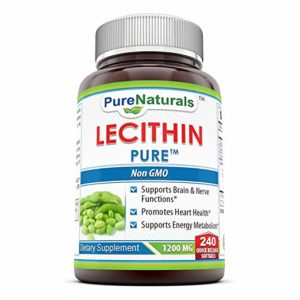
Pure Naturals is an extremely simple lecithin supplement that’s got 1200 mg of soy lecithin per gelatin capsule like many other products on the market, but what makes this supplement stand out is its commitment to being GMO-free.
Most soy grown and used in food products is genetically modified, but Pure Naturals goes the extra mile to keep the ingredients natural.
2. NOW Lecithin
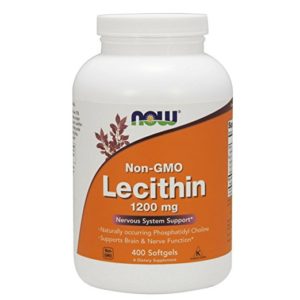
NOW Foods makes a high-dose lecithin supplement that comes in a bottle with 400 capsules, so you’re unlikely to run out any time soon.
The lecithin itself is derived from soy, and the capsule is made from gelatin. People looking for non-soy lecithin won’t be thrilled, but just about everyone else will appreciate the high dosage and large number of capsules included in this supplement.
3. Fearn Lecithin Granules
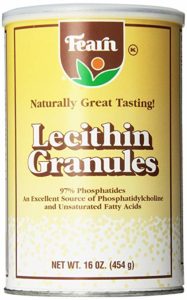
For those looking for more flexibility in how they dose their soy lecithin, Fearn Lecithin Granules are the perfect option.
This supplement comes with raw soy lecithin in rough granules in a cardboard tub. You can sprinkle these as a topping onto food, or blend it into a shake or smoothie.
It’ll take a little work, but thanks to lecithin’s strong emulsifying abilities, it will blend up well with other ingredients.
The flavor and texture aren’t for everyone, but if you want precise control over your soy lecithin intake, there’s no better choice.
4. NOW Sunflower Liquid Lecithin
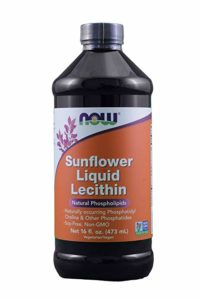
In addition to its soy-based capsule lecithin supplement, NOW also branches out with this sunflower-based source of lecithin that’s a prefect fit for anyone who wants lecithin but doesn’t want it from soy.
The liquid form also makes it easy to add to smoothies and shakes. Given the emulsifying properties of lecithin, it goes particularly well with natural protein powders and other supplements that tend to get clumpy in water on their own.
To top it off, this sunflower lecithin is non-GMO, which is hard to find (though not impossible) among soy-based lecithin supplements.
5. Legendairy Milk Sunflower Lecithin
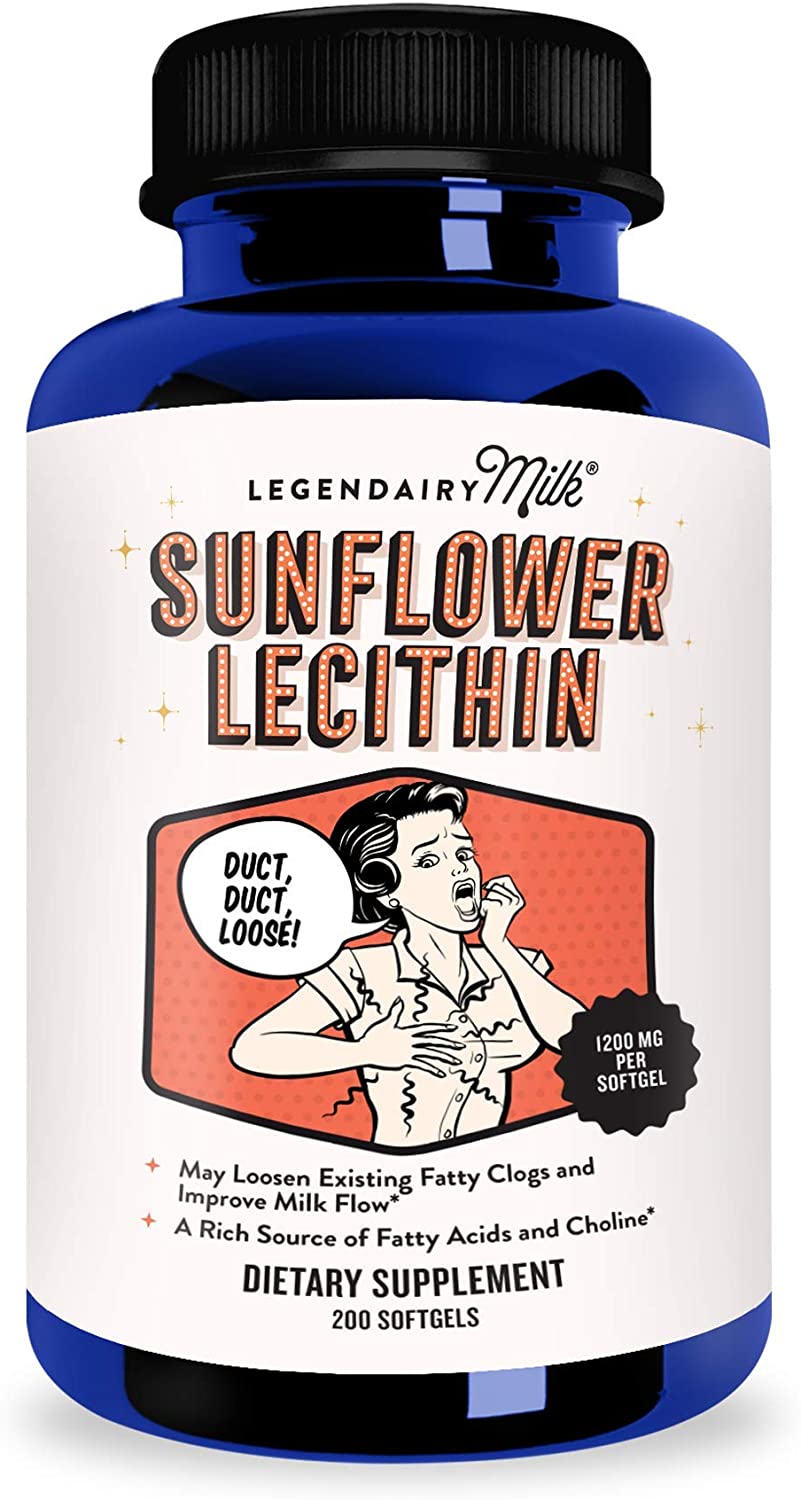
Legendairy Milk is a lecithin supplement specifically formulated for breastfeeding mothers. It’s soy-free, which is great, and the formulation is ultra-pure, making it a very solid pick if a soy-free capsule-based lecithin supplement is what you’re looking for.
6. Solgar Soya Lecithin
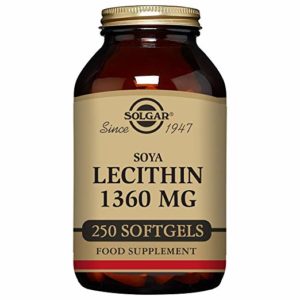
Solgar takes the crown for the highest dosage in a capsule-based soy lecithin supplement, though it’s only by about 13%.
You’ll find 1360 mg of soy lecithin in this supplement, compared to the usual 1200, and while that’s a small difference, it could add up. The supplement design is clean, with no unnecessary ingredients, making it a pretty solid choice.
7. Carlyle Sunflower Lecithin
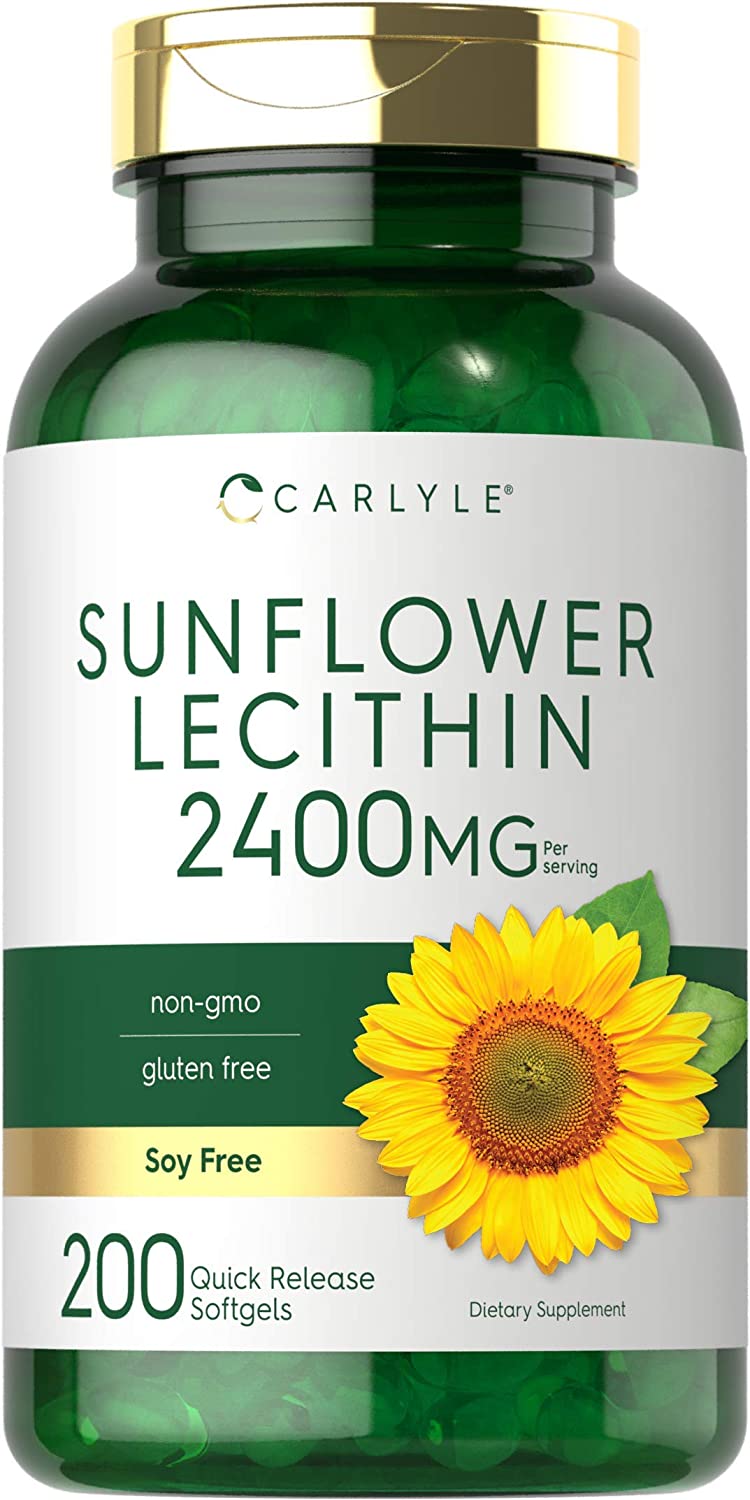
Carlyle makes a specialized lecithin supplement that’s sourced from sunflower instead of soy. Though soy-based lecithin is our default recommendation, it is a good non-soy-based alternative.
8. Natural Nutra Lecithin
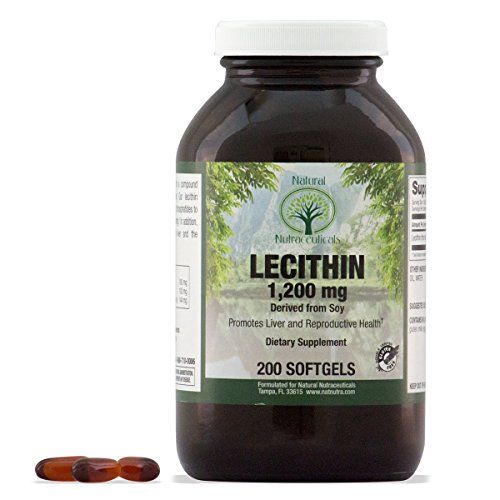
Natural Nutra Lecithin is a pretty run-of-the-mill lecithin supplement from a smaller supplement company. The dosage is fine, though there’s less information on ingredient sourcing and independent purity testing than the competition, which bumps it down in the rankings a bit.
9. Source Naturals Lecithin
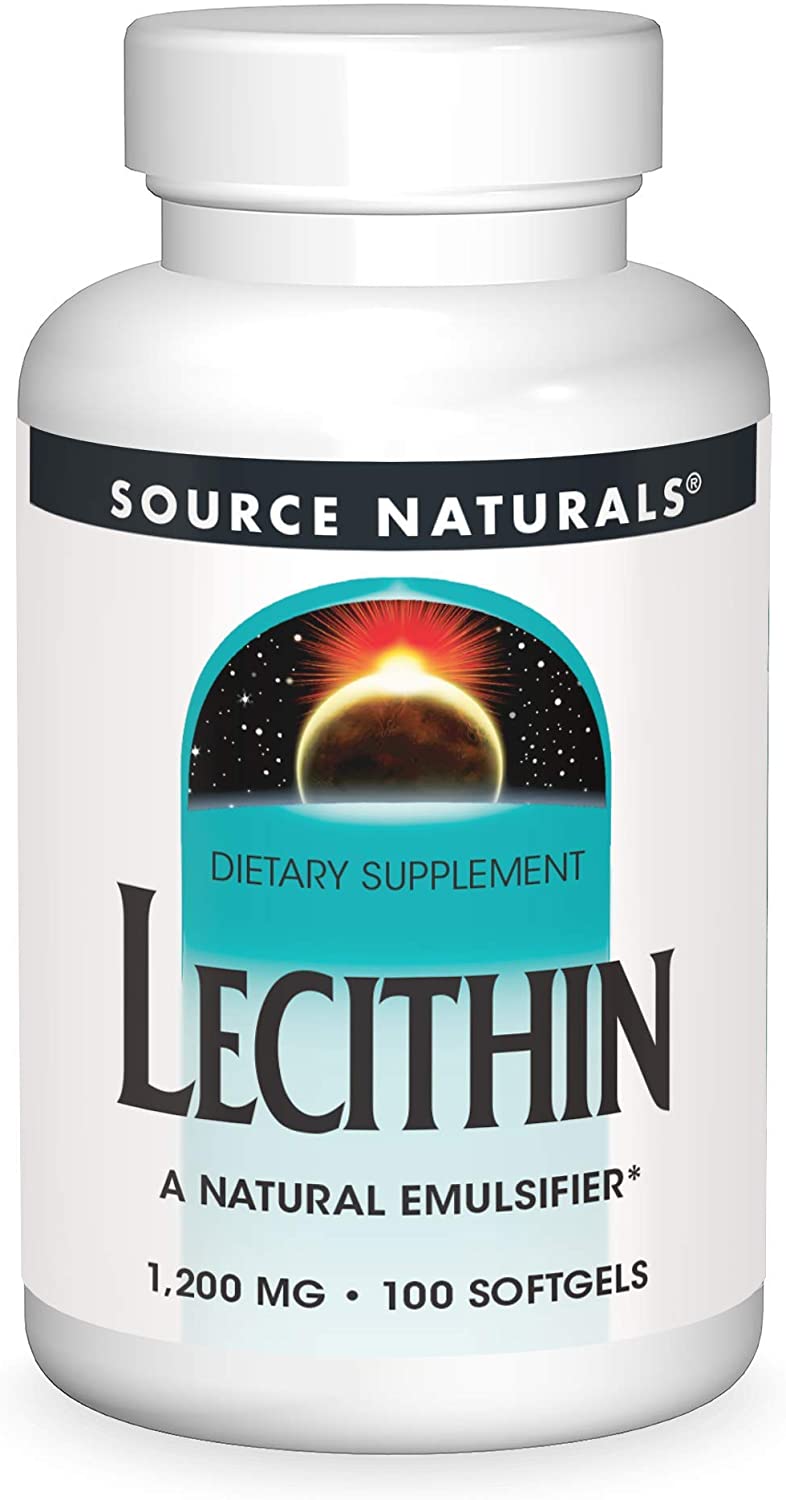
Source Naturals makes a pretty standard soy-derived lecithin supplement that has a clean, minimalist design. The only issue is that you only get 100 capsules per bottle, meaning you’ll run out pretty quick if you are on a high-dosage protocol.
10. GNC Triple Lecithin
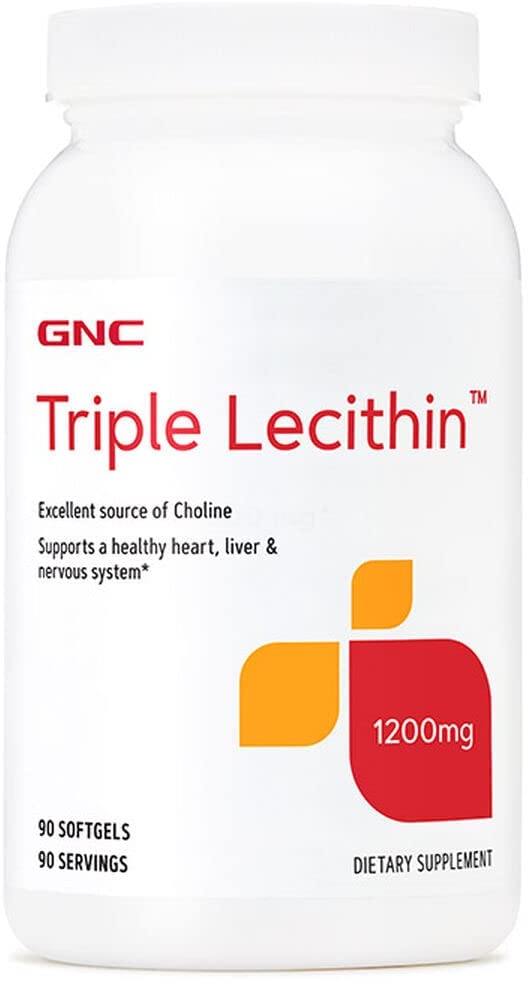
Despite the name GNC Triple Lecithin only uses one source (the usual soy lecithin) as its source of lecithin.
The dosage is solid, but there aren’t any defining features that make this an attractive option over what else is available on the market.
Category winners
Best lecithin overall: Pure Naturals Lecithin Pure
Pure Naturals secures our top spot thanks to its high dosage, simple formulation, and GMO-free sourcing. It’s an excellent all-around source of lecithin regardless of your use case.
Best lecithin for cognitive function: Pure Naturals Lecithin Pure
Given that lecithin is a very common supplement for enhancing and maintaining cognitive function, especially as you get older, it should come as no surprise that our top overall pick is also our top pick for cognitive function.
Best powder form lecithin: Fearn Lecithin Granules
Whether you are baking with lecithin or just looking for a good source of bulk lecithin to make your own supplement blends, Fearn makes a 16 oz canister that provides highly pure soy lecithin. You’ll need to figure out dosing on your own, but that’s a downside you’ll get with any powder-form lecithin supplement.
Best liquid lecithin: NOW Sunflower Liquid Lecithin
If you’re looking for a quick and easy source of lecithin to add to your smoothies and protein shakes, NOW Sunflower Liquid Lecithin is a great option. It’s already suspended in water, so you don’t have to worry about clumping when adding it to other liquids.
Best lecithin for heart health: NOW Lecithin
At 1200 mg of lecithin per capsule, NOW Lecithin packs a punch, and on top of that, the bottle comes with 400 capsules, making it the perfect buy if your goal is a sustained, high-dosage lecithin supplementation regimen. These qualities make it a good pick if you’re taking lecithin for its potential heart-health benefits.
Best soy-free lecithin: NOW Sunflower Liquid Lecithin
If you’re looking for a source of phosphatides that’s soy-free, NOW Sunflower Liquid Lecithin is our recommendation. Most lecithin supplements come from soy lecithin, but as the name suggests, this supplement is from sunflower seeds instead, making it a nice niche pick for soy-free diets.
Who Should Buy Lecithin?
Lecithin is generally considered safe across the entire population and is helpful in improving heart health, cholesterol and preventing liver damage. It is also great for improving cognitive performance and reducing cognitive decline since it is converted into acetylcholine.
Pregnant and breastfeeding women should avoid lecithin supplements as there isn’t enough research showing it’s safety in these populations. If you do fall into either of these categories and you still want to take lecithin, make sure you speak to your primary care physician first.
Lecithin has no severe drug interactions, so people taking medication should be safe to consume it once they get the go-ahead from their doctor. Since most lecithin is made from soybeans, people with allergies to soy should be wary before consuming it.
How We Ranked
Purity was of the utmost importance when filtering through the best lecithin supplements since soy (the main point of extraction for lecithin), is subject to a lot of pesticides and genetic modification. As such, we first looked for products that were non-GMO. Products that weren’t like GNC Triple Lecithin were penalized. Products that were, like both of NOW’s lecithin products, were rewarded and ranked in our top 5.
We also rewarded companies that provided third-party lab testing results. Fillers, additives, and coloring were also not tolerated, and products with a lot of these were either axed or penalized.
Lecithin supplements come in capsules, liquids, and powder form. While liquids and powders are easy to consume, they often provide less than accurate dosing. Furthermore, these products fail to mask the taste of lecithin (which some people don’t enjoy). As such, we preferred capsule-based products like Pure Naturals and Solgar over other forms.
Lastly, we analyzed the dosages. Unfortunately, there isn’t conclusive evidence into what the optimal dosage is for lecithin. In various trials, anywhere from 1.5g-6g has been used to treat various diseases. As such, we required all the best products to contain at least 1000mg of soy lecithin. This allowed for easy dosage tailoring, while also staying on the lower end to avoid any possible overdosing complications.
Benefits
Lecithin can reduce cholesterol and improve heart health. Lecithin plays a role in a number of biochemical reactions that involve blood lipids and cholesterol, and it appears that increasing lecithin intake can lead to a decrease in biomarkers that are risk factors for heart disease.
A study published in the journal Biochemical Medicine and Metabolic Biology by researchers at Rambam Medical Center in Haifa, Israel demonstrated this effect in nine patients with high blood lipids (1). Over the course of three months, the patients consumed 12 grams of soy lecithin every day.
The researchers found that this regimen decreased total cholesterol by 15%, decreased blood lipids by 23%, and increased HDL cholesterol (the “good” kind of cholesterol) by 16%.
These changes are all promising, because they are in the direction you’d want for better heart health: lower bad cholesterol, higher good cholesterol, and lower blood lipid.
Some researchers think that these benefits could be attributed to the omega 3 fatty acids in lecithin, but there’s evidence that other active compounds (specifically a class of chemicals called phosphatidyl serines) contribute as well.
Lecithin may help reverse liver damage. In the liver, lecithin seems to use a similar biochemical mechanism to reduce deposits of fat. In the blood vessels, high lipid (fat) levels are bad because they can cause heart disease, but in the liver, deposits of lipids can cause liver damage in a condition called, fittingly, fatty liver disease.
Fortunately, lecithin appears to help here, too. According to research by Jeffrey Cohn and other researchers at the Heart Research Institute in Sydney, Australia, the chemical mechanism for blocking cholesterol and decreasing lipid levels shows quite a bit of promise for treating and possibly reversing damage to the liver that’s caused by fat deposits (2).
The primary mode of action appears to be the phospholipid compounds in lecithin that block the absorption of sterols, including cholesterol. Though direct clinical evidence is sparse, one study published in 1990 did show that phospholipids from lecithin were able to reverse alcohol-induced liver damage in baboons (3).
Lecithin could treat or prevent cognitive decline. The blood and the liver aren’t the only parts of the body where the phospholipids in lecithin are biologically active.
They appear to play a strong role in bolstering well-being and cognitive performance. Initial research into these effects focused on people with early-stage dementia, cognitive decline, or memory problems.
One such study, published in the journal Clinical Investigations in Aging, investigated the effects of a soybean-based lecithin derivative on memory in 30 elderly volunteers who had memory problems (4).
Over the course of a 12 week supplementation routine, the researchers found that the supplement improved memory recognition, recall memory, and executive functioning. While this was a small study with no control group, the results were nevertheless promising.
Later work extended this line of thinking: a clinical trial published in the Israeli Journal of Psychiatry and Related Science in 2000 used an open-label design, with the same 300 mg per day dosage of phospholipids (5).
The trial found similar effects: among elderly subjects with memory decline, the lecithin-derived supplement showed a statistically significant improvement in measures of cognitive functioning. Later work using a double-blind, placebo-controlled design found similar effects, suggesting that these benefits are not merely the result of the placebo effect (6).
Lecithin can increase cognitive performance in stressful situations. Understandably, the research on lecithin and cognitive decline inspired other researchers to investigate whether lecithin could be used in healthy people as a nootropic to improve their cognitive performance.
One of the most promising areas of research is into the effects of lecithin on cognitive state while performing tasks under stressful conditions. One study, published in 2008 in the journal Nutritional Neuroscience by researchers at the University of Paderborn in Germany, used a placebo-controlled design to test whether phosphatidylserine derived from lecithin could improve cognitive performance while under stress (7).
The subjects took either a lecithin-derived supplement or a placebo for 42 days, then completed a stressful cognitive test while their brain waves were measured using electrodes attached to the scalp.
Compared to their own pre-test values, the subjects who were taking the lecithin-derived supplement performed better under stress, and showed brain wave patterns indicative of greater relaxation. The dosage in this study was pretty low; only 200 mg of phosphatidylserine, which could be obtained by taking a few grams of lecithin every day.
Side effects
Lecithin, especially derived from soy, is a particularly attractive supplement because it’s been extensively studied for safety.
It’s a “generally recognized as safe” ingredient according to the Food and Drug Administration, which means that there are no regulatory restrictions on its use in food (8). You could (and a few manufacturers do) sell 100% pure bulk soy lecithin as a food product without any problems.
Some people have expressed concern over high consumption of soy products in men—soy is somewhat similar, chemically speaking, to estrogen, and some epidemiological evidence suggests that greater soy contribution in Japanese men is associated with lower levels of testosterone (9).
However, the research is far from conclusive, and the size of the effect is not large. Men who are taking lecithin for high cholesterol, liver health, or to prevent cognitive decline don’t’ overlap too much with men who are hyper-concerned about their testosterone levels, so these worries are probably unfounded for most people.
Recommended dose
The dosage of lecithin varies widely from study to study and across different applications. In the research on heart disease, the most effective dosage is fairly high.
In the previously-mentioned study on blood lipids and cholesterol carried out by researchers in Israel, a second experiment was carried out to determine the optimal dosage.
In this experiment, the researchers tried doses ranging from six to 18 grams of soy lecithin per day. After analyzing how each of the different dosages affected the impact of the supplement on these biomarkers of heart health, they concluded that 12 grams per day achieved optimal results.
For liver health, there aren’t direct clinical trials, but given that the mechanism is thought to be the same, optimal dosages should likely be close, if not identical.
The story is a little different when it comes to lecithin for cognitive function and performance. Research on memory, for example, has used doses of 300 mg of phosphatidylserine per day, which works out to more like 1.5 to four grams of soy lecithin, assuming the typical chemical breakdown (10)—some lecithin supplements are specifically designed to have higher phosphatidylserine contents.
FAQ
Why does lecithin have such a broad use as a supplement? Lecithin helps maintain healthy cellular barriers in your body, which is likely why it finds such broad uses as a supplement.
It can be used to decrease cholesterol and protect your heart, protect your brain from cognitive decline, heal liver damage, and possibly even improve your cognitive function beyond its baseline level.
When should I take lecithin? Lecithin can be taken safely up to 3-4 times per day. Always read and follow the label of any supplements that you are taking, and talk to your doctor about the best time to take lecithin. There are no standard suggestions on whether lecithin is better to be taken with or without food.
Can I take lecithin if I am pregnant or breastfeeding? There is not enough information known about lecithin to know whether it’s safe to take during pregnancy, so it’s best to not take it at all. If you have any concerns or you’ve been taking lecithin, and you’ve become pregnant, please contact your doctor to discuss your options going forward. Some research has suggested that lecithin can be a solution for helping prevent clogged ducts in breastfeeding women.
If you struggle with recurrent duct issues, 1,200 mg of lecithin four times per day can help relieve the symptoms of a clogged duct. It’s suggested that lecithin decreases the viscosity of breastmilk, preventing clogging. However, if you’re feeling flu-like symptoms, please seek immediate medical care.
Can I take lecithin if I am on other medications? There are no clear indicators that lecithin interacts negatively with other medications; however, if you are on any prescription and want to start taking a supplement, always consult with your doctor before doing so.
What happens if I take too much lecithin? There is no set dosage for lecithin as it depends on the individual’s weight, age, overall health, and other factors. The appropriate dose of lecithin should be set by your doctor. Supplements are not regulated or monitored by the FDA, so there could be side effects that aren’t known or understood.
That being said, medical professionals know that lecithin should not exceed 5,000 mg per day. You should follow the label of the supplements you’re taking or what is suggested by your doctor or pharmacist. If you are taking a tablet supplement, do not combine different formulations of lecithin at the same time unless directed by your doctor. If you feel unwell and have taken a large dose of lecithin, or your ailment has not seen improvement, please consult your doctor or go to your nearest emergency room.
Can I take lecithin if I am taking other supplements? There are no indications that lecithin will react negatively with other natural supplements, but everyone reacts differently. Before adding lecithin to your routine, please contact your doctor or pharmacist.
How do I know if I am allergic to lecithin? If you have a lecithin allergy, you may experience a rash, itchiness, dizziness, nausea, or a general feeling of being unwell after consuming. Some lecithin supplements have soy in them, and these could be tolerated even if you have a soy allergy. If you feel any of these symptoms after taking lecithin, please go to your nearest emergency room.
Does lecithin cause gastrointestinal distress? Lecithin works to treat and improve digestion. Research has shown that people with ulcerative colitis have responded positively to lecithin supplementation. Due to the emulsifying qualities that lecithin has, it contributes to a chain reaction in the intestines.
It improves the mucus in the intestine during the digestion process, making it less taxing on the body while protecting the lining of the digestive system, which is very delicate. If you have IBS, lecithin may be a treatment that could help ease symptoms. Please consult your doctor before introducing a new supplement to your routine.
Can lecithin help me lose weight? It’s believed that lecithin can help aid in weight loss or increase the performance in athletes during a workout. If you are eating a variety of healthy foods in your diet, you are likely getting an adequate amount of lecithin, and a healthy balanced diet can lead to weight loss.
Lecithin seems to have the components that would facilitate healthy fat loss, but there is little research in this area and not enough clinical trials to prove either way. If you want to try lecithin as a weight loss supplement, please consult your doctor before taking it.
Does lecithin expire? There is a best before date on lecithin supplements that you should adhere to. Once that date has passed, do not consume the product.
How does lecithin affect my sleep schedule? There is insufficient evidence to suggest that lecithin has any impact on the sleep-wake cycle. If you have started taking lecithin and are experiencing a disruption in your normal routine, please consult your doctor.
How long does it take for lecithin to start working? There is no clear indication of how long the benefits of lecithin begin to manifest. Each person may see a different result based on health, age, weight, or other factors.
What are the best lecithin brands? Choosing the lecithin supplement that works for you will be a personal decision. A supplement from a brand that is established with a great reputation would be an ideal product to choose, but you can also ask for your doctor or pharmacist’s input on which might work best for you.
Some of the most popular supplements include Jamieson Lecithin, NOW Foods, Non-GMO Lecithin, NOW Sunflower Lecithin – Nervous System Support, Organika LECITHIN, and KIKI Health Lecithin Powder Non-GMO.
Is lecithin vegan? There are many options on the market for vegan lecithin supplements, but some of them do contain animal by-products. Always read the label to ensure a product is cruelty-free or vegan.
Does lecithin impact infertility? There is little evidence to show the impact of lecithin on male or female fertility. It has been suggested that a soy lecithin supplement may impact female hormones, but the research has not drawn any concrete conclusions. If you are seeking a potential treatment for infertility, please contact your doctor before taking a lecithin supplement.
Does lecithin impact memory loss? It’s suggested that lecithin could be a potential treatment for Alzheimer’s and Dementia patients because it contains the chemical Choline, which helps your brain communicate. Research has suggested that increased Choline consumption in the diet can help improve the memory and cognitive function in these patients.
Lecithin may improve the pathways in the brain, but there is some conflicting evidence on whether or not it can be used for patients with any nervous system or neurological conditions. There is much more research needed going forward before administering this supplement as a treatment.
Does lecithin impact blood pressure? A soy-derived lecithin supplement may improve your cardiovascular health if you are already in a high-risk category. Those who may develop high blood pressure or heart disease may benefit from adding this supplement to their routine. In a small study, patients were given soy lecithin supplements over time and saw positive results (11).
Soy can be difficult for the body to digest, making it take significantly longer to break down, and it could lead some individuals to feel fuller for longer. If you are at risk for high blood pressure, and you’re looking for a natural supplement to help combat that, please discuss the use of lecithin with your doctor before consuming.
What is lecithin made of? Many lecithin supplements are made with eggs, sunflower seeds, or soy. Soy is the most popular ingredient to create these supplements, but animal by-products like fats, corn, and fish are commonly used as well. Soy lecithin is often sold in granulated capsule form, but other varieties may be available in a powder or liquid form.
While sunflower Lecithin isn’t nearly as common as soy lecithin, it’s popular among those who avoid soy or want to avoid GMOs in their diet. Soy can be heavily modified during mass production, but sunflower seeds do not undergo the same processing. The extraction process on sunflower lecithin is much more delicate than soy and does not require chemicals.
If I have gallbladder disease, will lecithin be effective for me? There’s not enough evidence to show whether or not lecithin is effective for treating gallstones, but it’s suggested that the supplement may prevent the solidification of cholesterol in the gallbladder, ultimately preventing gallstones. There is insufficient proof to substantiate these claims, but if you have gallbladder disease and you want to try a lecithin supplement, please consult your doctor before taking it.
Can lecithin improve the look of my skin? While lecithin is included among the ingredients of popular skincare products, there’s little evidence that it has an impact on the look and feel of the skin. It’s commonly used as an emollient, which aids in making the skin smoother by hydrating it.
The type of lecithin used is called hydrogenated lecithin. When you use this product on its own, it’s suggested that it can cure acne and the effects of eczema, but there’s not much supporting evidence available. It is possible that taking a supplement will inherently improve the look of your skin, but there’s not enough research to conclude either way.
Related Articles
Recap
Lecithin can be taken as a supplement to improve heart and liver health, help with memory problems that occur with cognitive decline, and help boost your cognitive performance in stressful situations.
It’s a very safe supplement that appears to be most effective at doses ranging from 1.5 to 12 grams per day, depending on the application.
Its broad biological activity, from decreasing lipid and cholesterol levels to improving cognitive function, means a wide variety of people will find this supplement useful.
For BodyNutrition’s #1 recommended lecithin supplement, click here.